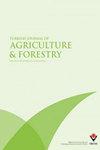针叶树和阔叶树混交对石灰岩山区土壤特性的影响及其机理
IF 3
2区 农林科学
Q1 AGRONOMY
引用次数: 0
摘要
:在恢复石灰岩山地生态系统的过程中,实现生态恢复和生态系统稳定的核心科学问题在于了解植被与土壤之间的相互作用机制。为此,我们重点研究了北亚热带典型石灰岩山区的四种人工森林群落,每种群落的树龄均为 30 年,针叶树和阔叶树的比例各不相同(0%-20%、20%-50%、50%-80%、80%-100%)。这些森林群落被选为研究对象,以评估林下植被多样性、落叶和细根特征。研究调查了各种混合比对恢复林下植被和土壤系统的影响。研究结果表明,在不同混合比例下,落屑存量、水容量、年分解率、养分变化率和落屑细根生物量均存在显著差异。随着针叶树比例的增加,立木落叶量和年产量都有所下降。因此,在石灰岩山区恢复和改善脆弱生态系统的有效策略是建立混交林或根据适度的混交比例进行森林改造。本文章由计算机程序翻译,如有差异,请以英文原文为准。
Effect and mechanisms of conifer and broadleaf mixtures on the soil characteristics in limestone mountains
: In restoring the limestone mountain ecosystem, the core scientific issue for achieving ecological restoration and ecosystem stability lies in understanding the interaction mechanism between vegetation and soil. To address this, we focused on four types of artificial forest communities, each 30 years old, with varying ratios of coniferous and broad-leaved trees (0%–20%, 20%–50%, 50%–80%, 80%–100%) in typical limestone mountainous areas of the northern subtropical region. These forest communities were selected as research subjects to assess understory vegetation diversity, litter fall, and fine root characteristics. The study investigates the influence of various mixing ratios on the restoration of understory vegetation and soil systems. The findings reveal significant differences in litter fall stock, water capacity, annual decomposition rate, nutrient change rate, and fine root biomass of litter fall among different mixing proportions. With an increase in the proportion of coniferous trees, both standing litter fall and annual yield exhibit a decrease. Consequently, an effective strategy for restoring and enhancing fragile ecosystems in limestone mountainous areas involves establishing mixed forests or conducting forest transformations based on a moderate mixing proportion.
求助全文
通过发布文献求助,成功后即可免费获取论文全文。
去求助
来源期刊
CiteScore
4.20
自引率
6.90%
发文量
42
审稿时长
12 months
期刊介绍:
The Turkish Journal of Agriculture and Forestry is published electronically 6 times a year by the Scientific and Technological Research Council of Turkey (TÜBİTAK).
It publishes, in English, full-length original research papers and solicited review articles on advances in agronomy, horticulture, plant breeding, plant protection, plant molecular biology and biotechnology, soil science and plant nutrition, bionergy and energy crops, irrigation, agricultural technologies, plant-based food science and technology, forestry, and forest industry products.

 求助内容:
求助内容: 应助结果提醒方式:
应助结果提醒方式:


